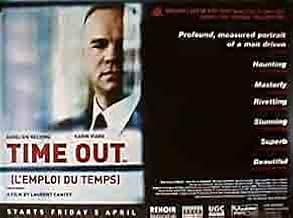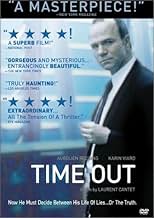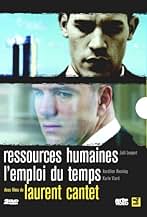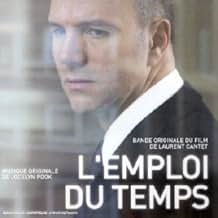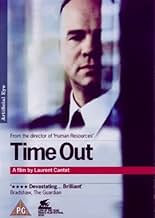IMDb-BEWERTUNG
7,3/10
5155
IHRE BEWERTUNG
Füge eine Handlung in deiner Sprache hinzuAn unemployed man finds his life sinking more and more into trouble as he hides his situation from his family and friends.An unemployed man finds his life sinking more and more into trouble as he hides his situation from his family and friends.An unemployed man finds his life sinking more and more into trouble as he hides his situation from his family and friends.
- Regie
- Drehbuch
- Hauptbesetzung
- Auszeichnungen
- 3 Gewinne & 8 Nominierungen insgesamt
Didier Reyes
- Philippe
- (as Didier Perez)
Empfohlene Bewertungen
10cestmoi
Has anybody ever set up a truck stop shot more magnificently?
This film is the full ten thing. Cast is spectacular, the photography superb, the unobtrusive music on the money, the story and its effects on the life of a family, affecting. Subtlety is a hallmark here. If you don't know the story line it must be even more powerful in a first viewing. As Fellini made at least two films that can be seen as defining the male of the Catholic/Italian species (8 1/2 & Amarcord) this magnificent film from France from a director I am not familiar with, defines "the problem of being male." I was fully involved and unable to complete a sentence for twenty minutes after the lights went up. But it is just not male identification at work here. It is the anguish and plight of the wife, magnificently played by Karen Viard, or the children who are as confused and anxious as any of us. The father, a very French man with a franc or euro, even redeems himself with love and compassion. And the "unsavory" seller of bogus goods who rescues our Vincent by offering employment, comes through swimmingly with compassion and understanding. I can not recommend this film enough. Please see it.
This film is the full ten thing. Cast is spectacular, the photography superb, the unobtrusive music on the money, the story and its effects on the life of a family, affecting. Subtlety is a hallmark here. If you don't know the story line it must be even more powerful in a first viewing. As Fellini made at least two films that can be seen as defining the male of the Catholic/Italian species (8 1/2 & Amarcord) this magnificent film from France from a director I am not familiar with, defines "the problem of being male." I was fully involved and unable to complete a sentence for twenty minutes after the lights went up. But it is just not male identification at work here. It is the anguish and plight of the wife, magnificently played by Karen Viard, or the children who are as confused and anxious as any of us. The father, a very French man with a franc or euro, even redeems himself with love and compassion. And the "unsavory" seller of bogus goods who rescues our Vincent by offering employment, comes through swimmingly with compassion and understanding. I can not recommend this film enough. Please see it.
Shakespeare spoke of the tangled web of deceit suggesting it was a terrible trap. Laurent Cantet presents us with another view. His hero in this film, Vincent (played to perfection by Aurelien Recoing) appears to revel in the freedom his dissembling brings...at least for a time. A middle-aged, middle class man who has lost his job keeps this information from his family and sets out on a complex journey of survival, both existentially and financially, involving schemes that he eventually has ambivalent feelings about. We also see another side to this complex man...the loving husband, father and son. Are we to judge and dislike this man? Should we cast the first stone?
I was particularly impressed by the subtle way Cantet depicted Muriel, Vincent's wife (performed with sensitivity and grace by Karin Viard). Her suspicions and uncertainties are written only on her lovely face...very little is ever said. And yet she's not seen as the long-suffering little woman...not at all. She appears independent and strong.
And then there's the affecting scenes in the snow-filled mountains... in that place of isolation (so representative of...well...of us all). There's majestic beauty and danger.
The mystery, the thought=provoking qualities of this film have made it for me a haunting and moving experience...One that I'd certainly recommend!
I was particularly impressed by the subtle way Cantet depicted Muriel, Vincent's wife (performed with sensitivity and grace by Karin Viard). Her suspicions and uncertainties are written only on her lovely face...very little is ever said. And yet she's not seen as the long-suffering little woman...not at all. She appears independent and strong.
And then there's the affecting scenes in the snow-filled mountains... in that place of isolation (so representative of...well...of us all). There's majestic beauty and danger.
The mystery, the thought=provoking qualities of this film have made it for me a haunting and moving experience...One that I'd certainly recommend!
Ironically, I just saw this a day after viewing Abbas Kiarostami's brilliant "Close Up", a story of a man who could no longer accept the endless banalities of his life and decided to become someone else (a film director!). That man had no sense of identity about himself but he knew what he cared about and what he believed in (the power of art and cinema). That brings him one up on the hero of this story. Vincent is a man who also cannot accept the banalities of his life, but he hasn't the foggiest idea of who he is or what he really cares about. It's as if he was born out of a computer software program. He knows what he's supposed to care about: nice home, nice car, nice bank account... But his work as an investor is so deprived of any human value that he loses all sense of values. His environment; a sterile, generic, upper middle-class vacuum that could make one believe that all of France has turned into Silicon Valley with a touch of the Scandinavian, has none of the passion or warmth that one identifies with being human. He has a loving wife, but according to his 'program', he believes that he would lose her if she knew that he was no longer able to function as a cog in the machine, and provide her with the lifestyle that she has grown accustomed to.
That is the first tragedy of Vincent, because his wife really does love him. The second tragedy of Vincent, is that even though he recognizes his need for freedom, he doesn't know how to use it. He's like a man who has been released from a lifetime of imprisonment, but still hangs around the prison yard because he is unable to comprehend what might be available to him. He'd lost his job because his love for being free was more important to him than keeping his appointments, but most of his time spent in his new-found freedom is in doing the same job he'd done before: investments. The only difference now is that he likes to believe that the investments are helping developing Third World countries. He knows that there really are no investments (he keeps the money that people give him and spends it on a nifty Range Rover, among other things), but momentarily, he can feel as if he is 'somebody' to his family and friends when he tells them of this meaningful new job he (allegedly) has.
Vincent has been described by many as 'everyman', but I think of him more as 'everyman who has just stepped through the looking glass'. Instead of taking a good, hard look at himself, he somehow ended up taking a look beyond himself because he could not find a reflection. He can't even recognize how much he's patterned his children to follow the same program he did. We see him teaching his kindergarten-age son how to 'hard sell' his toys at a school fair. Later, in a fascinating scene, we see him and his family doing what most people of his class do in their free time. They go shopping in an upscale, overpriced store to buy clothing that they know they don't really need. Vincent has it all, but it fills nothing in him. His family has it all, yet they don't seem to question the fact that they rarely spend any time together.
Laurent Candet has created a beautifully somber and sober look at the price of 'success'. The film is practically drained of all color, save for blues and grays, to illustrate the life force that has been systematically drained from Vincent throughout his life. And the score, a somber cello piece, refreshingly accentuates Vincent's mind instead of his actions (like most scores do). It is like a slow-moving merry-go-round that brings on a sense of familiarity that is simultaneously comfortable and unnerving. Because what the gist of it all is: is that no one wants to spend their life on a merry-go-round. Even a comfortable one.
That is the first tragedy of Vincent, because his wife really does love him. The second tragedy of Vincent, is that even though he recognizes his need for freedom, he doesn't know how to use it. He's like a man who has been released from a lifetime of imprisonment, but still hangs around the prison yard because he is unable to comprehend what might be available to him. He'd lost his job because his love for being free was more important to him than keeping his appointments, but most of his time spent in his new-found freedom is in doing the same job he'd done before: investments. The only difference now is that he likes to believe that the investments are helping developing Third World countries. He knows that there really are no investments (he keeps the money that people give him and spends it on a nifty Range Rover, among other things), but momentarily, he can feel as if he is 'somebody' to his family and friends when he tells them of this meaningful new job he (allegedly) has.
Vincent has been described by many as 'everyman', but I think of him more as 'everyman who has just stepped through the looking glass'. Instead of taking a good, hard look at himself, he somehow ended up taking a look beyond himself because he could not find a reflection. He can't even recognize how much he's patterned his children to follow the same program he did. We see him teaching his kindergarten-age son how to 'hard sell' his toys at a school fair. Later, in a fascinating scene, we see him and his family doing what most people of his class do in their free time. They go shopping in an upscale, overpriced store to buy clothing that they know they don't really need. Vincent has it all, but it fills nothing in him. His family has it all, yet they don't seem to question the fact that they rarely spend any time together.
Laurent Candet has created a beautifully somber and sober look at the price of 'success'. The film is practically drained of all color, save for blues and grays, to illustrate the life force that has been systematically drained from Vincent throughout his life. And the score, a somber cello piece, refreshingly accentuates Vincent's mind instead of his actions (like most scores do). It is like a slow-moving merry-go-round that brings on a sense of familiarity that is simultaneously comfortable and unnerving. Because what the gist of it all is: is that no one wants to spend their life on a merry-go-round. Even a comfortable one.
Time Out is, in essence, a psychological study of a man who is in "denial" after he loses his job as a Financial Consultant and resorts to lies and deception to keep up the pretense of employment for the sake of his family. Yet it is also a searing portrait of the failure of the workplace to provide a nurturing environment for people (not a theme much explored in the Hollywood assembly line these days).
Time Out is a subtle, involving, and truly perceptive film that deals with the shallow, conformist world of middle management. It depicts how an individual's identity can be so wrapped up in what they do that they can scarcely remember who they really are and what is most meaningful in their life. As Jonathan Rosenbaum has pointed out, it is reminiscent of Melville's "Bartelby the Scrivener" in its depiction of a banal middle-aged businessman who would just prefer not to tell the truth.
Aurélien Recoing (a popular French stage actor) plays Vincent, who is so detached from reality he goes through the motions of pretending to work for the United Nations on a development mission. His "job" is conveniently based away from his wife and three children in Switzerland. Here he spends his hours driving around in his car, going in and out of hotels and conference rooms, exerting as much energy in his pretense as he would if he were actually working. I think the point is that his "pretend" job is different only in degree from his former "real" one.
Cantet uses the business world with its offices, hotels, and associates to portray an individual whose day-to-day activity consists only in constructing a false life. Vincent has to resort to obtaining money under false pretenses from his friends and his father and to assist a petty criminal in his smuggling attempts. For all his lies, Vincent confesses how suffocating his job has been. "I don't know what I'm supposed to do," he cries to his wife, under the pretense of discussing his non-existent new position.
As he stands on the outside looking in, he slowly loses touch with everything that has given his life meaning. His family, who he truly loves, also cannot provide the emotional support he needs. The impression is that the lack of emotional expression, the failure to communicate, and the skimming along on the surface of life is not new to this family. These are the same people who live next door to you, always happy and smiling who seem to have it together until a crisis comes. Then, they have no inner strength to deal with it.
Time Out is a subtle, involving, and truly perceptive film that deals with the shallow, conformist world of middle management. It depicts how an individual's identity can be so wrapped up in what they do that they can scarcely remember who they really are and what is most meaningful in their life. As Jonathan Rosenbaum has pointed out, it is reminiscent of Melville's "Bartelby the Scrivener" in its depiction of a banal middle-aged businessman who would just prefer not to tell the truth.
Aurélien Recoing (a popular French stage actor) plays Vincent, who is so detached from reality he goes through the motions of pretending to work for the United Nations on a development mission. His "job" is conveniently based away from his wife and three children in Switzerland. Here he spends his hours driving around in his car, going in and out of hotels and conference rooms, exerting as much energy in his pretense as he would if he were actually working. I think the point is that his "pretend" job is different only in degree from his former "real" one.
Cantet uses the business world with its offices, hotels, and associates to portray an individual whose day-to-day activity consists only in constructing a false life. Vincent has to resort to obtaining money under false pretenses from his friends and his father and to assist a petty criminal in his smuggling attempts. For all his lies, Vincent confesses how suffocating his job has been. "I don't know what I'm supposed to do," he cries to his wife, under the pretense of discussing his non-existent new position.
As he stands on the outside looking in, he slowly loses touch with everything that has given his life meaning. His family, who he truly loves, also cannot provide the emotional support he needs. The impression is that the lack of emotional expression, the failure to communicate, and the skimming along on the surface of life is not new to this family. These are the same people who live next door to you, always happy and smiling who seem to have it together until a crisis comes. Then, they have no inner strength to deal with it.
A middle-aged middle class family man has a mid-life crisis.
Hardly an inspiring or original idea, yet Laurent Cantet creates a quite devastating and compelling landscape of one man's internal terror - terror at his situation and complete inability to express his feelings.
Through Cantet, a combination of economic script, astonishingly sparse and subtle performances, and Pook's deeply moving musical score, takes the viewer on a journey of displaced despair and futile attempts to paper over the cracks. Recoing is captivating, his face a turmoil of quiet bewilderment and pain, and he is ably matched by Viard as his increasingly unsettled partner. The penultimate scene between Recoing, Viard and their children is quite astonishing for its tension and disquiet.
In the end, however, the final scene says it all. Recoing's face tells us everything we need to know, and he really should have won every award going for this brilliant performance. Once again the French film industry shows us all how to make films.
Hardly an inspiring or original idea, yet Laurent Cantet creates a quite devastating and compelling landscape of one man's internal terror - terror at his situation and complete inability to express his feelings.
Through Cantet, a combination of economic script, astonishingly sparse and subtle performances, and Pook's deeply moving musical score, takes the viewer on a journey of displaced despair and futile attempts to paper over the cracks. Recoing is captivating, his face a turmoil of quiet bewilderment and pain, and he is ably matched by Viard as his increasingly unsettled partner. The penultimate scene between Recoing, Viard and their children is quite astonishing for its tension and disquiet.
In the end, however, the final scene says it all. Recoing's face tells us everything we need to know, and he really should have won every award going for this brilliant performance. Once again the French film industry shows us all how to make films.
Wusstest du schon
- WissenswertesInspired by a true story, that of Jean-Claude Romand. In reality, Romand went on to kill, on January 9, 1993, his wife, two children and both his parents. It is the first of three films in two years inspired by the case, followed by Ein perfektes Leben (2002) and Nobody's Life (2002), of which the former is the closest to the real events. Phantom (2002) was also inspired by the same incident.
- VerbindungenFeatured in The 2003 IFP Independent Spirit Awards (2003)
- SoundtracksL'Emploi Du Temps - Musique Originale
Composed by/ Arranged By Jocelyn Pook
Performed by 'Electra Strings' Ensemble
Cello Solo performed by Sophie Harris
Viola Solo performed by Clive Howard
Violin solo performed by Jacqueline Norrie
Phonographic Copyright (p) Jocelyn Pook / Haut et Court
Under Exclusive License To Virgin France
Published By Chester Music Ltd.
© 2001 Virgin France
Top-Auswahl
Melde dich zum Bewerten an und greife auf die Watchlist für personalisierte Empfehlungen zu.
- How long is Time Out?Powered by Alexa
Details
Box Office
- Bruttoertrag in den USA und Kanada
- 448.542 $
- Weltweiter Bruttoertrag
- 1.213.913 $
- Laufzeit2 Stunden 14 Minuten
- Farbe
- Sound-Mix
- Seitenverhältnis
- 1.85 : 1
Zu dieser Seite beitragen
Bearbeitung vorschlagen oder fehlenden Inhalt hinzufügen




